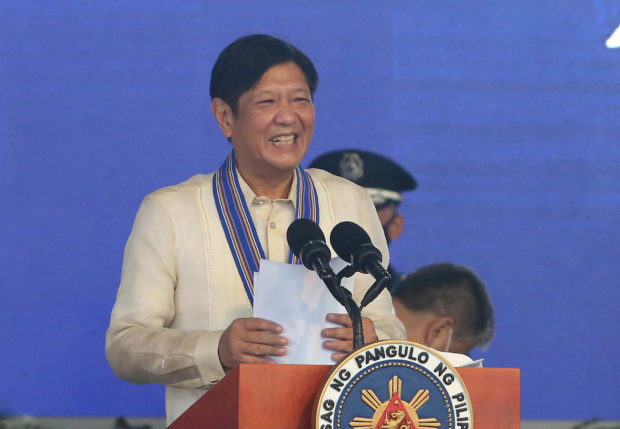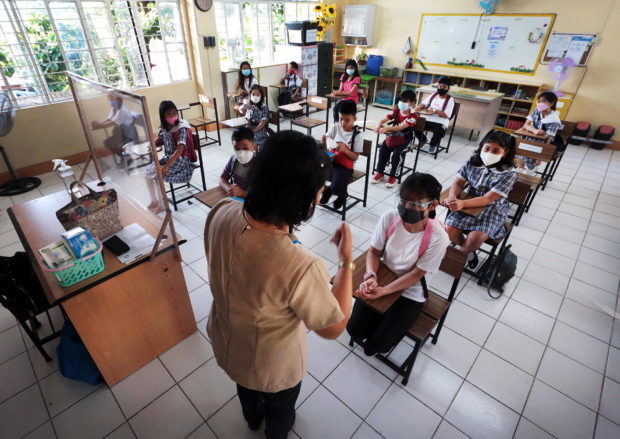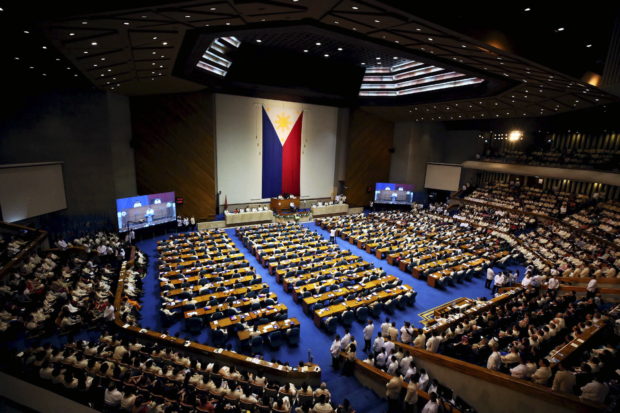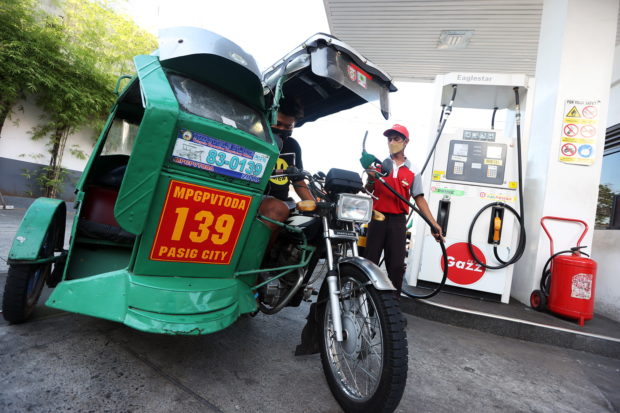Wish list for Bongbong Marcos on promised recovery path

President Bongbong Marcos attends his first engagement as President of the republic with former President Gloria Macapagal Arroyo at the 75th Founding anniversary of the Phil. Airforce in Clark city Pampanga on July 1.
INQUIRER/ MARIANNE BERMUDEZ
MANILA, Philippines — Filipinos the world over will be watching closely as President Ferdinand Marcos Jr. charts the country’s course in his first State of the Nation Address (ONA) at the Batasang Pambansa in Quezon City on Monday, five decades after his namesake father addressed Congress for the first time as president on Jan. 24, 1966.
“We are in crisis,” the older Marcos declared then during his speech at the Legislative Building in Manila. Today, 56 years later, his son faces a nation on the precipice of another crisis, weathering high inflation, mounting debt, hunger, joblessness, and a crippling pandemic.
What does the public want to hear from the Philippines’ 17th leader, who made national recovery — “Babangon tayong muli!” — his mantra to poll victory and now boasts the largest electoral mandate under the current multiparty system? Here are some of the wishes and demands of vital sectors and stakeholders for Marcos’ first SONA.
Agriculture and food security
Former Agriculture Secretary William Dar has suggested a list of programs that the Marcos administration should prioritize to help achieve the president’s goal of food security and food sovereignty.
One of the programs is the Balanced Fertilization Strategy, which seeks to upscale the use of bio-fertilizers and stimulants. A bigger budget for fuel and fertilizer subsidy to subsidize other commodities such as vegetables is also crucial, Dar said.
Article continues after this advertisementThe Philippine Chamber of Agriculture and Food Inc. has proposed using a portion of the funds designated for local government units (LGUs) to support the agriculture industry to help with the current food crisis.
Article continues after this advertisementThe group suggests the issuance of a presidential directive that would channel at least 10 percent of the internal revenue allotment of LGUs to agriculture production or value chain projects in the respective local governments.
Under Republic Act No. 7581, or the Price Act, the president has the authority to freeze prices of basic necessities during a state of calamity.
National farmer group Kilusan Para sa Tunay na Repormang Agraryo at Katarungang Panlipunan has appealed to Mr. Marcos to allow more coconut farmers to have a voice in the management of the coco levy fund, which comes from proceeds of a tax imposed during his father’s rule.
The collections were supposed to benefit coconut farmers but lawsuits filed after the ouster of the elder Marcos alleged that the dictator’s cronies diverted the funds to finance their own business interests.
Magsasaka party-list Rep. Argel Cabatbat has called for the review of Rice Tariffication Act to promote food sovereignty and discourage the flooding of Philippine markets with imported rice, as well as an increase in the budget for the agricultural sector.
He says Marcos’ aspiration of bringing rice prices down to P20 per kilo would be possible if the sector were given full government support.
Albay Rep. Joey Salceda has urged Marcos to hasten tax incentives for agricultural subsectors under the Strategic Investment Promotion Plan, the list of industries eligible for tax perks under the Corporate Recovery and Tax Incentives for Enterprises Act or the Create law.
Other agriculture groups also want the Marcos administration to intervene and urgently minimize the gap between farm gate and retail prices of agricultural goods. Stakeholders in particular urge Marcos, who oversees the agriculture department, to reduce the number of intermediaries between producers and consumers to lower market prices.
The Management Association of the Philippines (MAP) has also called on the administration to prioritize the agriculture sector, pushing for the improvement of food value chains by enhancing transport and logistic facilities to help the agriculture industry develop.
Various fisheries groups have urged the president to certify as urgent the measure seeking to create the Department of Fisheries and Aquatic Resources.
Health sector

TOP OF MIND When he faces joint Congress today, President Marcos has to address calls to repeal the oil deregulation law and scrap the 12-percent value-added tax on petroleum products amid
the soaring prices of fuel, as well as demands to ramp up spending on health and raise the pay of entry-level nurses. —NIÑO JESUS ORBETA/REUTERS
Health-care workers are urging the new administration to ramp up public spending on health and implement a pay increase for entry-level nurses and other healthcare providers.
In May, Alliance of Health Workers president Robert Mendoza proposed raising the government budget on health care to 10 percent of the country’s gross domestic product, and the monthly wage of government frontline health workers with Salary Grade 1 to P25,000 from the previous P13,000.
The group has also called for the appointment of a “pro-health worker, pro-people” health secretary with a trustworthy track record in good governance and integrity.
The Philippine Nurses Association has urged Marcos to push for the passage of amendments to the Philippine Nursing Act to address problems concerning the salaries and benefits of nurses in private and public hospitals, a move seen to encourage them to stay in the country.
Several groups have urged the president to revamp the Philippine Health Insurance Corp. (PhilHealth), an agency marred with corruption allegations during the previous administration.
MAP has pushed for an overhaul of PhilHealth’s leadership and management, which should include investing in a “technology-enabled management system and private outsourcing of certain functions.”
According to Salceda, the state health insurer should review premium payments, including those paid by overseas Filipino workers (OFWs), noting that it should be “fairer” to OFWs who might pay as much as P38,400 a year in mandatory contributions despite a lack of Philippine hospitals outside the country.
Education sector

A LOT ON HIS PLATE | Yet another item on President Marcos’ plate are the concerns raised by school administrators, educators, and parents about the government’s plan to resume in-person classes in public and private schools by Nov. 2 this year. Mr. Marcos allayed some of these when he declared that “blended learning” would continue beyond Oct. 31 in “specific areas.” (File photo by GRIG C. MONTEGRANDE / Philippine Daily Inquirer)
Sen. Sherwin Gatchalian has urged the Marcos administration to prioritize providing sufficient training for teachers and quality education to students to counteract the education crisis in the Philippines through the immediate implementation of Republic Act No. 11713, or the Excellence in Teacher Education Act.
ACT Teachers Rep. France Castro has called on Marcos and Vice President Sara Duterte, who heads the education department, to prioritize raising teachers’ low wages, which have remained at Salary Grade 11, to make them on a par with the wages of nurses, soldiers, and police officers.
MAP has stressed the significance of mapping a strategy to address the country’s learning crisis in the education sector. The influential private sector group has also called for the reinstatement of in-person education in schools in locations with low COVID-19 risk.
Labor welfare
Salceda has called on the government to implement a comprehensive plan for job creation after the Philippine Statistics Authority reported that up to 2.9 million of Filipinos were unemployed in May.
He proposes reviving the National Broadband Network project and suggested expanding satellite internet availability in more remote areas to ensure Filipinos can find digital jobs globally.
Castro has also urged the Marcos administration to cease contractualization and regularize long-serving contract workers in government.

TIME TO DELIVER | President Marcos is expected to spell out his administration’s solutions to soaring fuel prices, high inflation, mounting debt, hunger and joblessness when he delivers his maiden State of the Nation Address before an estimated 1,300guests at the Batasang Pambansa this afternoon. (MALACAÑANG PHOTO)
Rule of law and human rights
Human rights advocates, among them Sen. Risa Hontiveros, former Sen. Leila de Lima and the lawyers’ group Manananggol Laban sa Extrajudicial Killings, are calling for the country’s reinstatement as a member of the International Criminal Court (ICC).
In 2018, then President Rodrigo Duterte ordered the country’s withdrawal from the Rome Statute, the United Nations (UN) treaty that created the ICC.
The groups also urge Mr. Marcos to let human rights investigations take their due course, particularly the ICC prosecutor’s investigation of his predecessor’s drug war.
Albay Rep. Edcel Lagman has prodded the president to order public prosecutors to stop from further prosecuting De Lima, saying her release from detention would be “the litmus test of his sense of justice and adherence to the rule of law.”
De Lima has been detained at the Philippine National Police Custodial Center in Camp Crame for over five years while on trial for drug charges. One of the three drug cases has been dismissed while main prosecution witnesses in two other pending cases have voluntarily recanted their statements, claiming they were coerced to testify against De Lima, a staunch critic of Duterte.
Former members of the Commission of Human Rights (CHR) and rights advocates are pushing for the inclusion of nominees to the CHR from civil society groups, the academe, and other sectors, and allowing people’s participation in vetting potential candidates.
International watchdog Human Rights Watch has also called on the president to choose “qualified and independent” human rights advocates to lead the CHR in a transparent and inclusive process.
Marcos was inaugurated as president shortly after the terms of the CHR chair and its four commissioners ended. The commission was among the institutions specifically created by the framers of the 1987 Constitution to protect human rights in response to abuses committed during his father’s dictatorship.
Red-tagging
Families of community organizers who have disappeared in the last two months are calling on the Marcos administration to help find their loved ones and stop the enforced disappearances of dissidents.
Family and friends of Alipio “Ador” Juat, Elizabeth Magbanua, Elgene Mungcal, and Elena Cortez believe the four labor and peasant organizers were abducted by state security forces. Juat, a longtime unionist for Kilusang Mayo Uno, was previously arrested and tortured under the dictatorship of Mr. Marcos’ father.
The families also call for the junking of Executive Order No. 70, which created the controversial National Task Force to End Local Communist Armed Conflict, a body known for falsely identifying activists, progressives, and government critics as communist rebels or sympathizers.
Economy, debt management
Duterte’s economic team led by Dominguez has urged the Marcos administration to prioritize infrastructure development, to be partly funded by another round of tax reforms, under the proposed fiscal consolidation and resource mobilization plan.
The plan entails new and higher taxes, postponement of income tax cuts for individual taxpayers, cuts on nonpriority spending, and infrastructure development prioritization.
Investors and economists urge the president to lay out his economic plans amid inflationary pressures and high public debt two years into the COVID-19 pandemic. Investors are anticipating renewed focus on economic recovery measures from the pandemic, such as the reopening of the economy and the creation of more jobs.
However, Gatchalian wants the administration to avoid raising taxes or imposing new ones as a means to address the P12.763-trillion national debt. Instead, it should focus on improving the Bureau of Internal Revenue and Bureau of Customs, two of the country’s top revenue agencies but also the most notoriously corrupt, according to the senator.
Territorial sovereignty
Former Foreign Secretary Albert del Rosario has urged the president to continuously raise the arbitral award in the United Nations General Assembly and sponsor a UN resolution affirming the support of other nations in upholding the award.
Del Rosario believes Marcos should continue to strengthen the Armed Forces, encourage the use of joint patrols with other security partners, and reinforce security partnerships with the United States.
However, he also suggests that Marcos resume oil exploration efforts in the West Philippine Sea and deploy the Philippine Navy and Coast Guard to accompany the contracted survey ships. Negotiations on the planned joint oil exploration were terminated in June upon Duterte’s instructions.
Salceda has suggested to Marcos to renegotiate a way to independently estimate an inventory of the energy assets in the West Philippine Sea, with international observation and audit, as this would provide knowledge about the resources in the area without undermining the country’s sovereignty.
Fuel prices

TOP OF MIND | When he faces joint Congress today, President Marcos has to address calls to repeal the oil deregulation law and scrap the 12-percent value-added tax on petroleum products amid
the soaring prices of fuel, as well as demands to ramp up spending on health and raise the pay of entry-level nurses. (File photo by NIÑO JESUS ORBETA / Philippine Daily Inquirer)
Progressive groups have called on the Marcos administration to repeal the oil deregulation law and scrap the 12-percent value-added tax on petroleum products after a series of oil price increases.
Quezon Rep. Reynan Arrogancia has proposed a 90-day suspension of fuel excise or the distribution of more targeted subsidies to more Filipinos.
Arrogancia also urges the Marcos administration to push the members of the Organization of the Petroleum Exporting Countries to boost their crude oil production to lower oil prices on the world market.
Sen. Grace Poe has called on the Land Transportation Franchising and Regulatory Board and the Department of the Interior and Local Government to submit the list of verified names of fuel subsidy recipients in the public transportation sector.
Future of Naia
Former Finance Secretary Carlos Dominguez III wants the Marcos administration to consider shutting down Ninoy Aquino International Airport (Naia) and selling the large tract of land where it sits to raise revenue. Naia has the potential to be developed as mixed-use space, according to Dominguez.
Clark International Airport has begun operating its new terminal while a massive airport city project is being built in Bulacan.
Think tank Infrawatch PH, on the other hand, has recommended reviving the Naia rehabilitation project through a public-private collaboration, saying Marcos should include Naia among his priority infrastructure projects in his first 100 days.
Nuclear energy
The government’s nuclear science chief is pushing for the adoption of small modular reactors (SMRs) instead of refurbishing the mothballed Bataan Nuclear Power Plant.
According to Carlo Arcilla, director of the Department of Science and Technology’s Philippine Nuclear Research Institute, the Philippines can save on construction costs because SMRs are built in the country of origin. In a presentation last month, Arcilla indicated that SMRs are ideal for isolated islands in the country not connected to the grid.
SMRs are smaller and can produce low-carbon electricity at a lower generating capacity than conventional nuclear facilities, according to the International Atomic Energy Agency.
—COMPILED BY AIRA BERNARDO AND BEA GARCIS (INQUIRER INTERNS)
RELATED STORY